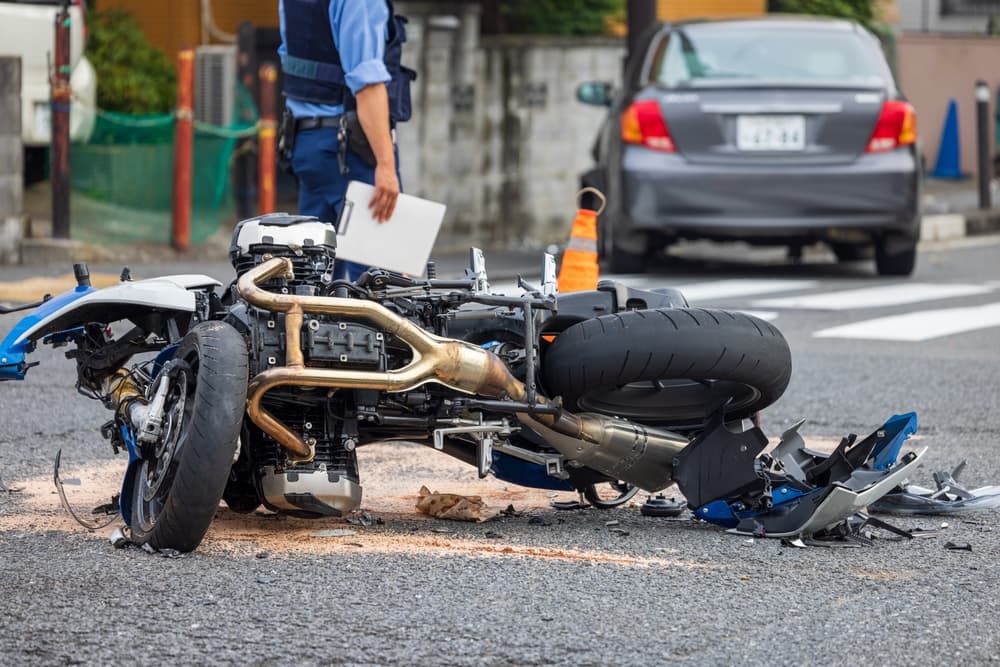Getting injured in a motorcycle accident can turn your life upside down. Along with physical pain and emotional trauma, navigating the legal landscape can be bewildering.
One of the common questions motorcycle accident victims ask is, “How long will this lawsuit take?” It is a reasonable question, especially when medical bills pile up and you cannot work.
The legal process can, however, be complex and time-consuming. Every case is unique, and the timeline varies greatly depending on various factors. The best way to understand what to expect is to engage the services of an experienced motorcycle accident attorney to guide you through the process and represent your interests at each stage.
Factors That May Prolong the Duration of Your Lawsuit
When embarking on a legal journey following a motorcycle accident, it is natural to wonder how long the process might take. Every lawsuit is unique, and various factors can prolong your case. Understanding these factors can better prepare you and help manage your expectations during your case.

Severity and Complexity of Injuries
The nature and severity of your injuries can significantly extend the lawsuit. If your injuries are severe or complicated, fully understanding their long-term effects might take time. This understanding is crucial in determining a fair and comprehensive claim amount.
Parties Involved and Their Cooperation
The number of parties involved and their level of cooperation also influence the timeline. Disputes over who is responsible or a lack of cooperation can complicate proceedings and extend the timeframe.
Availability and Clarity of Evidence
The clarity and amount of available evidence also make a difference. Clear, substantial evidence can speed up the process, whereas scarce, unclear, or disputed evidence may mean you need more time for a proper investigation.
Role of Insurance Companies After an Accident
Insurance companies play a significant role in the process, and their willingness to negotiate and settle can shorten or prolong your lawsuit. When these companies are reluctant to offer a fair settlement, it can cause delays and often necessitates a court trial.
The Court Schedule
The court's schedule and backlog of cases also influence how long your lawsuit will take. Your attorney has no control over this, but they can work diligently to progress your case through the system as rapidly as the courts permit.
While desiring a quick resolution is understandable, it is paramount that the lawsuit is thorough and results in a fair outcome for you. Your lawyer's role is to navigate these complexities, aiming for the most favorable result possible.
Stages of a Motorcycle Accident Lawsuit
Understanding the stages of a motorcycle accident lawsuit can help shed light on the process and what you may expect. The precise path of your case, however, depends on several aspects, and your lawyer can provide further insight that is individual to your situation. Here is a summary of these stages to give you a clearer picture of the lawsuit timeline:
Initial Consultation With Your Attorney
Your journey typically starts with an initial consultation, where you discuss the details of your case with your attorney. They may advise you on your options, your case's likely course, and the steps ahead.
Investigation and Evidence Collection
Following the consultation, the attorney begins investigating the accident, gathering and analyzing all pertinent evidence to substantiate your case. This crucial step can take a long time.
Negotiations With Insurance Companies
When negotiations with the insurance company begin, your attorney uses the evidence they have collected to pursue a fair settlement offer. The length and outcome of this stage are unpredictable and largely depend on the insurance company's cooperation.
Filing a Lawsuit if Necessary
If insurance negotiations fail to achieve a fair settlement, your lawyer may commence a lawsuit on your behalf. This means filing legal documents and introducing your case to the court system.
The Discovery Process
During the discovery phase, both sides share information and evidence. This crucial phase involves questioning witnesses, taking depositions, and exchanging documents and allows your lawyer to further strengthen your case.
Mediation or Settlement Negotiations
Before your case goes to trial, you often have another chance to settle your case through mediation or settlement negotiations. This is a quicker and more cost-effective route to obtaining damages.
Heading to Trial
If you do not reach a settlement, the case proceeds to trial. During the trial, your lawyer presents your case to the court, and a judge or jury makes a final decision.
Appeal if Necessary
If you disagree with the verdict, your attorney may advise filing an appeal. This is usually the last stage in the legal process, and it is uncommon in personal injury cases.
As you can see, the timeline depends on various factors, many of which are outside your lawyer's control. An experienced motorcycle accident attorney can navigate each of these stages efficiently while prioritizing your interests.
The Emotional Toll of a Lawsuit
Taking legal action following a motorcycle accident is not just about the physical injuries you sustain. There is also an emotional aspect that you cannot ignore. This process can be stressful and draining, which is why having a compassionate legal team by your side can make all the difference in managing this difficult period.
The Mental and Emotional Stress of a Prolonged Lawsuit
A lawsuit can span a long time, inviting anxiety, stress, and frustration, especially when you are also dealing with physical pain and recovery. Uncertainty about the future, financial strain, and the burden of pursuing justice can be emotionally challenging.
The Importance of Having a Supportive Legal Team
An experienced and skilled motorcycle accident attorney does not just offer legal assistance—they provide emotional support and understanding, helping you manage the stress and strain of the legal process. They act as your advocate, not just in the courtroom but throughout the entire process, ensuring that you do not shoulder the burden alone.
The Legal Rights of the Injured Party
Following a motorcycle accident, you have the legal right to seek compensation for your economic and non-economic damages, which include:
- Medical expenses related to hospitalization, doctors’ visits, surgeries, prescription medications, and other treatments.
- Lost income due to the inability to work.
- Personal property damages.
- Ongoing medical expenses.
- Physical pain and suffering.
- Mental distress.
- Humiliation and inconvenience due to your injuries.
- Loss of enjoyment and quality of life.
In addition, depending on the circumstances of the crash, you may also be entitled to punitive damages. Victims do not receive these damages to compensate for the harm and losses they suffer after an accident.
Instead, the court awards these damages to penalize the wrongful party for their egregious actions and stop others from committing them in the future. Due to this standard, the court does not award these damages in every motorcycle accident case.
How Much Compensation Can You Receive After a Motorcycle Accident?
While an attorney can determine what types of financial damages you can pursue in a motorcycle accident lawsuit, they cannot tell you exactly how much compensation you will receive because of the many factors at play, including:
- The severity of your injuries.
- The permanence of your injuries.
- The credibility of the evidence presented.
- The extent of the pain and suffering resulting from the accident.
- The amount of money available, including insurance coverage.
- Your ability to take part in everyday activities without help.
- Your ability to work after the accident.
- Your ability to work in the same position after the accident.
- The number of medical treatments you need and for how long you will require these treatments.
A skilled motorcycle accident attorney can determine how these factors influence your case and prepare the strongest legal argument in response to them as they pursue the maximum compensation on your behalf.
The Time Limitations Involved With Filing a Legal Claim Following a Motorcycle Accident
Another issue you must keep in mind following a motorcycle accident is the deadlines for filing your claim. Every state has laws dictating how long you have to file a lawsuit following an incident, known as the statute of limitations. If you do not file your claim within that period, the court can stop you from pursuing financial damages. While these timelines depend on the state where the accident occurred and the type of claim you bring, exceptions can apply that extend or contract these timelines.
To ensure that you successfully file your case before time runs out, contact a skilled motorcycle accident attorney as soon as possible. These legal professionals can review the appropriate statutes and the facts of your case and determine exactly how much time you have to file your claim. They can also prepare and submit all the required motions and files before this time runs out.
Note that even though you may have years to pursue legal action after a motorcycle accident, it may not be in your interest to wait that long because the longer you wait to bring your legal claim, the higher the chance of evidence disappearing, memories of the incident fading, and witnesses no longer being able to testify on your behalf—all of which can hurt your claim and your chance of securing the compensation you need.
Contact an Experienced Motorcycle Accident Attorney Today and Get the Answers You Need

The complexity of the legal process, the time a claim can take, and the emotional toll combine to make a motorcycle accident lawsuit challenging.
If a motorcycle accident injured you or a loved one, call a personal injury attorney as soon as possible. An attorney can provide detailed insight into your case, guide you through the legal landscape, and work tirelessly to secure the best possible outcome.







